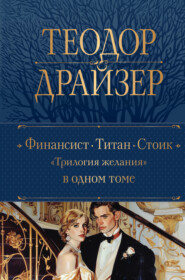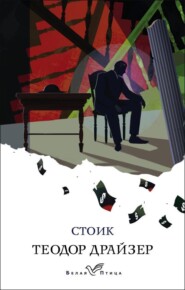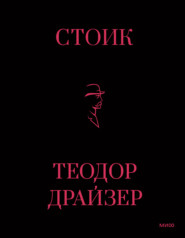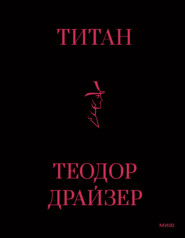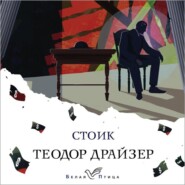По всем вопросам обращайтесь на: info@litportal.ru
(©) 2003-2024.
✖
The Financier / Финансист
Настройки чтения
Размер шрифта
Высота строк
Поля
“Look at these little putty-faced Philadelphians,” he continued, “They ought to come down to my ranch in Cuba and get tanned up. That would take away this waxy look.” And he pinched the cheek of Anna Adelaide, now five years old. “I tell you, Henry, you have a rather nice place here.” And he looked at the main room of the rather conventional three-story house with a critical eye.
Measuring twenty by twenty-four and finished in imitation cherry, with a set of new Sheraton parlor furniture it presented a quaintly harmonious aspect. Since Henry had become teller the family had acquired a piano—a decided luxury in those days—brought from Europe; and it was intended that Anna Adelaide, when she was old enough, should learn to play. There were a few uncommon ornaments in the room—a gas chandelier for one thing, a glass bowl with goldfish in it, some rare and highly polished shells, and a marble Cupid bearing a basket of flowers. It was summer time, the windows were open, and the trees outside, with their widely extended green branches, were pleasantly visible shading the brick sidewalk. Uncle Seneca strolled out into the back yard.
“Well, this is pleasant enough,” he observed, noting a large elm and seeing that the yard was partially paved with brick and enclosed within brick walls, up the sides of which vines were climbing. “Where’s your hammock? Don’t you string a hammock here in summer? Down on my veranda at San Pedro I have six or seven.”
“We hadn’t thought of putting one up because of the neighbors, but it would be nice,” agreed Mrs. Cowperwood. “Henry will have to get one.”
“I have two or three in my trunks over at the hotel. My niggers make ’em down there. I’ll send Manuel over with them in the morning.”
He plucked at the vines, tweaked Edward’s ear, told Joseph, the second boy, he would bring him an Indian tomahawk, and went back into the house.
“This is the lad that interests me,” he said, after a time, laying a hand on the shoulder of Frank. “What did you name him in full, Henry?”
“Frank Algernon.”
“Well, you might have named him after me. There’s something to this boy. How would you like to come down to Cuba and be a planter, my boy?”
“I’m not so sure that I’d like to,” replied the eldest.
“Well, that’s straight-spoken. What have you against it?”
“Nothing, except that I don’t know anything about it.”
“What do you know?”
The boy smiled wisely. “Not very much, I guess.”
“Well, what are you interested in?”
“Money!”
“Aha! What’s bred in the bone, eh? Get something of that from your father, eh? Well, that’s a good trait. And spoken like a man, too! We’ll hear more about that later. Nancy, you’re breeding a financier here, I think. He talks like one.”
He looked at Frank carefully now. There was real force in that sturdy young body—no doubt of it. Those large, clear gray eyes were full of intelligence. They indicated much and revealed nothing.
“A smart boy!” he said to Henry, his brother-in-law. “I like his get-up. You have a bright family.”
Henry Cowperwood smiled dryly. This man, if he liked Frank, might do much for the boy. He might eventually leave him some of his fortune. He was wealthy and single.
Uncle Seneca became a frequent visitor to the house—he and his negro body-guard, Manuel, who spoke both English and Spanish, much to the astonishment of the children; and he took an increasing interest in Frank.
“When that boy gets old enough to find out what he wants to do, I think I’ll help him to do it,” he observed to his sister one day; and she told him she was very grateful. He talked to Frank about his studies, and found that he cared little for books or most of the study he was compelled to pursue. Grammar was an abomination. Literature silly. Latin was of no use. History—well, it was fairly interesting.
“I like bookkeeping and arithmetic,” he observed. “I want to get out and get to work, though. That’s what I want to do.”
“You’re pretty young, my son,” observed his uncle. “You’re only how old now? Fourteen?”
“Thirteen.”
“Well, you can’t leave school much before sixteen. You’ll do better if you stay until seventeen or eighteen. It can’t do you any harm. You won’t be a boy again.”
“I don’t want to be a boy. I want to get to work.”
“Don’t go too fast, son. You’ll be a man soon enough. You want to be a banker, do you?”
“Yes, sir!”
“Well, when the time comes, if everything is all right and you’ve behaved yourself and you still want to, I’ll help you get a start in business. If I were you and were going to be a banker, I’d first spend a year or so in some good grain and commission house. There’s good training to be had there. You’ll learn a lot that you ought to know. And, meantime, keep your health and learn all you can. Wherever I am, you let me know, and I’ll write and find out how you’ve been conducting yourself.”
He gave the boy a ten-dollar gold piece with which to start a bank-account. And, not strange to say, he liked the whole Cowperwood household much better for this dynamic, self-sufficient, sterling youth who was an integral part of it.
Chapter III
It was in his thirteenth year that young Cowperwood entered into his first business venture. Walking along Front Street one day, a street of importing and wholesale establishments, he saw an auctioneer’s flag hanging out before a wholesale grocery and from the interior came the auctioneer’s voice: “What am I bid for this exceptional lot of Java coffee, twenty-two bags all told, which is now selling in the market for seven dollars and thirty-two cents a bag wholesale? What am I bid? What am I bid? The whole lot must go as one. What am I bid?”
“Eighteen dollars,” suggested a trader standing near the door, more to start the bidding than anything else. Frank paused.
“Twenty-two!” called another.
“Thirty!” a third. “Thirty-five!” a fourth, and so up to seventy-five, less than half of what it was worth.
“I’m bid seventy-five! I’m bid seventy-five!” called the auctioneer, loudly. “Any other offers? Going once at seventy-five; am I offered eighty? Going twice at seventy-five, and”—he paused, one hand raised dramatically. Then he brought it down with a slap in the palm of the other—“sold to Mr. Silas Gregory for seventy-five. Make a note of that, Jerry,” he called to his red-haired, freckle-faced clerk beside him. Then he turned to another lot of grocery staples—this time starch, eleven barrels of it.
Young Cowperwood was making a rapid calculation. If, as the auctioneer said, coffee was worth seven dollars and thirty-two cents a bag in the open market, and this buyer was getting this coffee for seventy-five dollars, he was making then and there eighty-six dollars and four cents, to say nothing of what his profit would be if he sold it at retail. As he recalled, his mother was paying twenty-eight cents a pound. He drew nearer, his books tucked under his arm, and watched these operations closely. The starch, as he soon heard, was valued at ten dollars a barrel, and it only brought six. Some kegs of vinegar were knocked down at one-third their value, and so on. He began to wish he could bid; but he had no money, just a little pocket change. The auctioneer noticed him standing almost directly under his nose, and was impressed with the stolidity—solidity—of the boy’s expression.
“I am going to offer you now a fine lot of Castile soap—seven cases, no less—which, as you know, if you know anything about soap, is now selling at fourteen cents a bar. This soap is worth anywhere at this moment eleven dollars and seventy-five cents a case. What am I bid? What am I bid? What am I bid?” He was talking fast in the usual style of auctioneers, with much unnecessary emphasis; but Cowperwood was not unduly impressed. He was already rapidly calculating for himself. Seven cases at eleven dollars and seventy-five cents would be worth just eighty-two dollars and twenty-five cents; and if it went at half—if it went at half—
“Twelve dollars,” commented one bidder.
“Fifteen,” bid another.
“Twenty,” called a third.
“Twenty-five,” a fourth.
Then it came to dollar raises, for Castile soap was not such a vital commodity. “Twenty-six.” “Twenty-seven.” “Twenty-eight.” “Twenty-nine.” There was a pause. “Thirty,” observed young Cowperwood, decisively.
The auctioneer, a short lean faced, spare man with bushy hair and an incisive eye, looked at him curiously and almost incredulously but without pausing. He had, somehow, in spite of himself, been impressed by the boy’s peculiar eye; and now he felt, without knowing why, that the offer was probably legitimate enough, and that the boy had the money. He might be the son of a grocer.
“I’m bid thirty! I’m bid thirty! I’m bid thirty for this fine lot of Castile soap. It’s a fine lot. It’s worth fourteen cents a bar. Will any one bid thirty-one? Will any one bid thirty-one? Will any one bid thirty-one?”
“Thirty-one,” said a voice.
“Thirty-two,” replied Cowperwood. The same process was repeated.
“I’m bid thirty-two! I’m bid thirty-two! I’m bid thirty-two! Will anybody bid thirty-three? It’s fine soap. Seven cases of fine Castile soap. Will anybody bid thirty-three?”
Young Cowperwood’s mind was working. He had no money with him; but his father was teller of the Third National Bank, and he could quote him as reference. He could sell all of his soap to the family grocer, surely; or, if not, to other grocers. Other people were anxious to get this soap at this price. Why not he?
Measuring twenty by twenty-four and finished in imitation cherry, with a set of new Sheraton parlor furniture it presented a quaintly harmonious aspect. Since Henry had become teller the family had acquired a piano—a decided luxury in those days—brought from Europe; and it was intended that Anna Adelaide, when she was old enough, should learn to play. There were a few uncommon ornaments in the room—a gas chandelier for one thing, a glass bowl with goldfish in it, some rare and highly polished shells, and a marble Cupid bearing a basket of flowers. It was summer time, the windows were open, and the trees outside, with their widely extended green branches, were pleasantly visible shading the brick sidewalk. Uncle Seneca strolled out into the back yard.
“Well, this is pleasant enough,” he observed, noting a large elm and seeing that the yard was partially paved with brick and enclosed within brick walls, up the sides of which vines were climbing. “Where’s your hammock? Don’t you string a hammock here in summer? Down on my veranda at San Pedro I have six or seven.”
“We hadn’t thought of putting one up because of the neighbors, but it would be nice,” agreed Mrs. Cowperwood. “Henry will have to get one.”
“I have two or three in my trunks over at the hotel. My niggers make ’em down there. I’ll send Manuel over with them in the morning.”
He plucked at the vines, tweaked Edward’s ear, told Joseph, the second boy, he would bring him an Indian tomahawk, and went back into the house.
“This is the lad that interests me,” he said, after a time, laying a hand on the shoulder of Frank. “What did you name him in full, Henry?”
“Frank Algernon.”
“Well, you might have named him after me. There’s something to this boy. How would you like to come down to Cuba and be a planter, my boy?”
“I’m not so sure that I’d like to,” replied the eldest.
“Well, that’s straight-spoken. What have you against it?”
“Nothing, except that I don’t know anything about it.”
“What do you know?”
The boy smiled wisely. “Not very much, I guess.”
“Well, what are you interested in?”
“Money!”
“Aha! What’s bred in the bone, eh? Get something of that from your father, eh? Well, that’s a good trait. And spoken like a man, too! We’ll hear more about that later. Nancy, you’re breeding a financier here, I think. He talks like one.”
He looked at Frank carefully now. There was real force in that sturdy young body—no doubt of it. Those large, clear gray eyes were full of intelligence. They indicated much and revealed nothing.
“A smart boy!” he said to Henry, his brother-in-law. “I like his get-up. You have a bright family.”
Henry Cowperwood smiled dryly. This man, if he liked Frank, might do much for the boy. He might eventually leave him some of his fortune. He was wealthy and single.
Uncle Seneca became a frequent visitor to the house—he and his negro body-guard, Manuel, who spoke both English and Spanish, much to the astonishment of the children; and he took an increasing interest in Frank.
“When that boy gets old enough to find out what he wants to do, I think I’ll help him to do it,” he observed to his sister one day; and she told him she was very grateful. He talked to Frank about his studies, and found that he cared little for books or most of the study he was compelled to pursue. Grammar was an abomination. Literature silly. Latin was of no use. History—well, it was fairly interesting.
“I like bookkeeping and arithmetic,” he observed. “I want to get out and get to work, though. That’s what I want to do.”
“You’re pretty young, my son,” observed his uncle. “You’re only how old now? Fourteen?”
“Thirteen.”
“Well, you can’t leave school much before sixteen. You’ll do better if you stay until seventeen or eighteen. It can’t do you any harm. You won’t be a boy again.”
“I don’t want to be a boy. I want to get to work.”
“Don’t go too fast, son. You’ll be a man soon enough. You want to be a banker, do you?”
“Yes, sir!”
“Well, when the time comes, if everything is all right and you’ve behaved yourself and you still want to, I’ll help you get a start in business. If I were you and were going to be a banker, I’d first spend a year or so in some good grain and commission house. There’s good training to be had there. You’ll learn a lot that you ought to know. And, meantime, keep your health and learn all you can. Wherever I am, you let me know, and I’ll write and find out how you’ve been conducting yourself.”
He gave the boy a ten-dollar gold piece with which to start a bank-account. And, not strange to say, he liked the whole Cowperwood household much better for this dynamic, self-sufficient, sterling youth who was an integral part of it.
Chapter III
It was in his thirteenth year that young Cowperwood entered into his first business venture. Walking along Front Street one day, a street of importing and wholesale establishments, he saw an auctioneer’s flag hanging out before a wholesale grocery and from the interior came the auctioneer’s voice: “What am I bid for this exceptional lot of Java coffee, twenty-two bags all told, which is now selling in the market for seven dollars and thirty-two cents a bag wholesale? What am I bid? What am I bid? The whole lot must go as one. What am I bid?”
“Eighteen dollars,” suggested a trader standing near the door, more to start the bidding than anything else. Frank paused.
“Twenty-two!” called another.
“Thirty!” a third. “Thirty-five!” a fourth, and so up to seventy-five, less than half of what it was worth.
“I’m bid seventy-five! I’m bid seventy-five!” called the auctioneer, loudly. “Any other offers? Going once at seventy-five; am I offered eighty? Going twice at seventy-five, and”—he paused, one hand raised dramatically. Then he brought it down with a slap in the palm of the other—“sold to Mr. Silas Gregory for seventy-five. Make a note of that, Jerry,” he called to his red-haired, freckle-faced clerk beside him. Then he turned to another lot of grocery staples—this time starch, eleven barrels of it.
Young Cowperwood was making a rapid calculation. If, as the auctioneer said, coffee was worth seven dollars and thirty-two cents a bag in the open market, and this buyer was getting this coffee for seventy-five dollars, he was making then and there eighty-six dollars and four cents, to say nothing of what his profit would be if he sold it at retail. As he recalled, his mother was paying twenty-eight cents a pound. He drew nearer, his books tucked under his arm, and watched these operations closely. The starch, as he soon heard, was valued at ten dollars a barrel, and it only brought six. Some kegs of vinegar were knocked down at one-third their value, and so on. He began to wish he could bid; but he had no money, just a little pocket change. The auctioneer noticed him standing almost directly under his nose, and was impressed with the stolidity—solidity—of the boy’s expression.
“I am going to offer you now a fine lot of Castile soap—seven cases, no less—which, as you know, if you know anything about soap, is now selling at fourteen cents a bar. This soap is worth anywhere at this moment eleven dollars and seventy-five cents a case. What am I bid? What am I bid? What am I bid?” He was talking fast in the usual style of auctioneers, with much unnecessary emphasis; but Cowperwood was not unduly impressed. He was already rapidly calculating for himself. Seven cases at eleven dollars and seventy-five cents would be worth just eighty-two dollars and twenty-five cents; and if it went at half—if it went at half—
“Twelve dollars,” commented one bidder.
“Fifteen,” bid another.
“Twenty,” called a third.
“Twenty-five,” a fourth.
Then it came to dollar raises, for Castile soap was not such a vital commodity. “Twenty-six.” “Twenty-seven.” “Twenty-eight.” “Twenty-nine.” There was a pause. “Thirty,” observed young Cowperwood, decisively.
The auctioneer, a short lean faced, spare man with bushy hair and an incisive eye, looked at him curiously and almost incredulously but without pausing. He had, somehow, in spite of himself, been impressed by the boy’s peculiar eye; and now he felt, without knowing why, that the offer was probably legitimate enough, and that the boy had the money. He might be the son of a grocer.
“I’m bid thirty! I’m bid thirty! I’m bid thirty for this fine lot of Castile soap. It’s a fine lot. It’s worth fourteen cents a bar. Will any one bid thirty-one? Will any one bid thirty-one? Will any one bid thirty-one?”
“Thirty-one,” said a voice.
“Thirty-two,” replied Cowperwood. The same process was repeated.
“I’m bid thirty-two! I’m bid thirty-two! I’m bid thirty-two! Will anybody bid thirty-three? It’s fine soap. Seven cases of fine Castile soap. Will anybody bid thirty-three?”
Young Cowperwood’s mind was working. He had no money with him; but his father was teller of the Third National Bank, and he could quote him as reference. He could sell all of his soap to the family grocer, surely; or, if not, to other grocers. Other people were anxious to get this soap at this price. Why not he?






